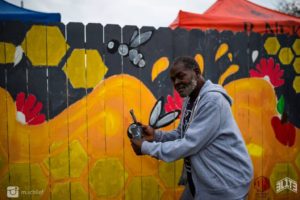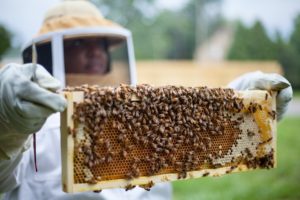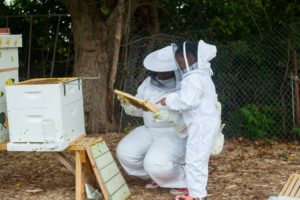A Guest Article for REVITALIZATION by Keith Crispen.
Colony collapse disorder (CCD) is damaging the honeybee population—and thus the honey-making and crop-pollination industry—in America, and around the globe.
Simultaneously, many human cities and neighborhoods have experienced what might be called “economic collapse disorder,” with Detroit, Michigan being a prime example. Here’s a story of how humans who are revitalizing the bees are helping to revitalize their neighborhoods.

Keith Crispen (left), Timothy Jackson (right), Co-Directors of Detroit Hives. Credit: Detroit Free Press, by Kimberly Mitchell
The CCD phenomenon occurs when worker honeybees leave the hive due to scarcity of pollination sources (e.g. wildflowers, grass untreated by pesticides/herbicides, etc.), and never return.
There are many hypotheses attempting to identify various causes of CCD. One the most accepted says that the malnutrition / immunodeficiencies, loss of habitat mostly due to climate change, and harmful chemicals in pesticides that are routinely sprayed in fields/gardens.
This, in turn, causes growth stagnation issues with our country’s crops and decreases the agriculture industry’s ability to meet food demands as our population continues to grow with time.
The bottom line: we need cross-pollinators to pollinate the food humans eat to survive.
Importance of Cross-Pollination
Entomophily, or insect pollination, is a process whereby the pollen of plants is distributed by insects. This type of pollination is responsible for the lion’s share (most estimates project over 65%) of the pollination that occurs in nature, so a world without it would offer significantly less to humankind’s food needs with an ever-increasing population.
Regardless of your diet, surely we all would suffer not only in terms of volume scarcity, but also in the way of a limited variety, with the list of foods requiring insect pollination for growth being so extensive.
In 2005, the Agriculture and Consumer Protection Department of the Food and Agriculture Organization of the United Nations estimated that the worth of global crops that require honeybee pollination was $200 billion. Additionally, the shortages of bees in the U.S. have caused farmers’ expenses to rise by over 20% (on average) to rent pollinator services. All of which transfer higher costs and more limited produce amounts to consumers.
Detroit Hives: The Origin
Detroit Hives is a 501c(3) Nonprofit Organization, founded in 2017 in Detroit, MI by Timothy Jackson and Nicole Lindsey. The mission of the organization is to promote honeybee awareness through educating communities as the organization aims their efforts toward transforming vacant lots into urban bee farms. The concept has worked well in Detroit, mostly due to the abundance of vacant lots and abandoned property in the city.
These vacant lots are mostly full of wild grass and/or wildflowers, undisturbed by pesticides or herbicides, with an ecologically balanced presence of insects. These factors equate untapped potential, which set the stage for Jackson and Lindsey to put action behind their ideas to bring urban bee farming to the City of Detroit.
Detroit Hives: The Evolution
The story of how Detroit Hives came to be is one of common colds; and centers on Jackson, who experienced an unfortunate cold with unrelenting symptoms for months in early 2017. After trying common home remedies, Jackson visited his local hospital for a more detailed prognosis and medicinal recommendation –– only to find that after weeks, the antibiotics prescribed did nothing to rid him of the cold.
Desperate for relief, Jackson visited a local grocer that exclusively stocks locally grown produce, and the owner recommended he try locally sourced raw honey to combat the ailment. Skeptical but out of options, Jackson tried the honey (1 teaspoon per day) for two weeks, and like magic, Jackson’s symptoms had subsided and his illness had been reversed. But how?
Jackson began to immerse himself in studying the medicinal benefits of locally sourced raw honey, and discovered a litany of natural benefits. Of them, and most impressive to Jackson, was raw honey’s immunotherapy properties that assist the human body in naturally creating antibodies and activating white blood cells to fight off sickness. From there, Jackson discovered more benefits: blood sugar regulation/reversal of diabetic blood sugar imbalance, natural energy boost, and skin/hair health improvement being a few among many.
After sharing his experience with the grocery store owner, Jackson wanted to purchase more of the honey, but the product shelf was bare. There is a shortage of locally sourced honey available, mostly due to CCD. Having such a perception-altering experience, only to be met with the unavailability of more locally sourced raw honey sparked thoughts that soon turned into action.
Detroit Hives: Current Work
Jackson shared his new-found knowledge with his partner Lindsey, and they collaborated to execute a strategy to purchase vacant lots and transform them into urban bee farms. Jackson and Lindsey felt compelled to share not only the knowledge, but the benefits of locally sourced raw honey with Detroiters. They partnered with Keep Growing Detroit and Sweet on Detroit to become Certified Beekeepers, successfully completing their training program in 2017.
Also in 2017, Jackson purchased a vacant lot, and soon purchased another. The first lot, located at 9336 East Warren Avenue, Detroit, MI 48205, is approximately 3,500 square feet, and is home to 250,000 honey bees. The second is located at 19791 Hoover and is a 32,800 square foot concrete-paved parcel, where Jackson and Lindsey plan to operate as the country’s first beekeeping co-working space, hosting hives for other organizations/institutions and providing them with hive maintenance services performed by a committed volunteered network.
In early 2018, Jackson and Lindsey brought in the help of a friend and business partner, Keith Crispen, MCD. Crispen and Jackson had worked on many projects before, with Jackson’s professional roots in photography and graphic design and Crispen’s background in startup consulting and community development –– so much, in fact, that they both served as leadership for their creative agency, Marspaule.
Crispen’s past work had included curriculum writing for proprietary school clients and community development with various municipalities/community development corporations (CDCs), making him a perfect fit to take Detroit Hives to the next level.
Jackson and Crispen currently serve as Co-Directors of Detroit Hives, while Lindsey serves as Assistant Director.
Detroit Hives: Areas of Focus
Since adding Crispen to the team, he and Jackson have identified three core focus areas for Detroit Hives: 1. Education, 2. Community Development, and 3. Social Enterprise. These areas are all based in honeybee education and awareness, and have both the environment and bee farmers in mind.
Education: The Education focus area is centered on educating the community, and is executed on by involving the residents of the community in the upkeep and activity at each bee farm. Volunteers have helped to paint the fence with beautiful bee-inspired murals, plant flowers, harvest honey and beeswax, maintain the hive upkeep, and maintain the grounds in natural pollinator-friendly ways that promote the health and growth of their bees.
Additionally, Detroit Hives has partnered with Ford Motor Company Fund and their Men of Courage campaign to pilot a 100-student educational program centered on apiology (the study of honeybees) designed to counteract melissaphobia (the fear of honeybees), educate students on the honeybees place in the urban garden, and teach the tenets of social entrepreneurship and triple bottom line (TBL) business activities.
Community Revitalization: Jackson and Crispen have met with Detroit’s City Council, and are currently co-writing legislation (to be voted on) that encourages the ethical treatment of pollinators (e.g. honeybees) and promotes the transformation of vacant lots into apiaries with zoning ordinance accommodations and tax incentives.
Detroit Hives is also working with municipalities to better educate policy shapers on the implications of CCD and consulting with them to offer guidance on honeybee population conservation methodologies.
Lastly, the organization has created an Urban Beekeeper Certificate program, designed to empower those interested in creating a social enterprise around urban beekeeping with the necessary knowledge base and skillset to do so. Detroit Hives plans to work with municipalities, CDCs, colleges and universities, and other quasi-governmental (employment) agencies to train and certify program participants.
Social Enterprise: Jackson and Crispen have created a for-profit arm (Detroit Bee Company) that operates as an extension of Detroit Hives, educating the public on the importance of honeybees to the ecological balance of the natural environment and on the implications of the honeybee population decline due to CCD –– but, in a way that is focused on the financial implications of the business opportunities of beekeeping.
Detroit Bee Company is working with large multinational retailers in the food, cosmetic, and pharmaceutical industries to present business opportunities to local bee farmers that they otherwise would not have access to. These partnerships can take the form of white-labeling, wholesaling, co-branding, and other hybrid business arrangements designed to supply major distributors with an otherwise scarce supply of needed goods.
Detroit Hives: The Future
The goals of the organization are grand, and as their Co-Director Crispen states with a smile, “Expansion, always in all ways is the goal.” That said, the organization has defined finite goals for each of the 3 focus areas and is strategically pursuing each of them.
Education: The educational vertical of Detroit Hives will focus on educating 1 million people on the honeybees place in the urban landscape and the ethical treatment of cross-pollinators, and they plan to accomplish this goal in a 5-year time span.
Community Development: Detroit Hives plans to influence national legislation, impact social change, and empower communities with the knowledge and skillset of urban beekeeping. In doing so, the goal is to increase the hive count in this country by 50,000 –– or 1,000 per state. This will significantly impact the environment and our crop projections in a positive way, and counteract CCD in a monumental way.
Social Enterprise: The for-profit arm of Detroit Hives (Detroit Bee Company) will create economic opportunities for bee farmers across the US. This will be done by focusing on the 3 main industries: 1. Honey/bees wax, 2. Cosmetics, and 3. Pharmaceuticals. These industries are currently estimated at $3.5 billion, collectively. Our work will be aimed at increasing the size of the industry by 25% with our business development model. Additionally, we plan to increase the availability of locally sourced raw honey by 10,000 pounds, annually.
Conclusion
Detroit Hives’ work is transforming the eyesores, child hazards, and dumping grounds that are vacant lots into beautiful safe spaces for communities to interact with nature, learn about honeybees, and build beekeeping skills that can have significant economic potential.
Like Detroit, many inner cities that have experienced population change have an abundance of vacant parcels that could benefit significantly from such a transformative initiative.
Those same cities generally do not have convenient access to fresh produce, and with the spike in urban farm build-outs across the nation, urban beekeeping makes good community sense, it makes good environmental sense, and it makes good economic sense.
As Detroit Hives continues to engage in buzz-worthy expansion activities, look for them to partner with big names like Michelle Obama (who understands the importance of honeybees; so much so, in fact, she arranged for bees to be kept at the White House estate during her stay), Beyoncé (also known as the
“Queen Bey” (pronounced “bee”) and whose fan base is known as the ‘Bey (bee) hive’), Wu Tang Clan (once known as the ‘Killer Bees’), and Gucci (who incorporates bees in their designs).
So far, the organization has partnered with other local organizations such as Detroit Peace Tree Parks to beautify their first vacant lot turned urban bee farm; and businesses, such as Slows BBQ to incorporate Detroit Hives’ honey in their slow-smoked recipes.
Detroit Wick uses Detroit Hives’ bees wax to create a Detroit-Based bees wax scented candle. A Detroit-based natural cosmetic line, C.R.E.A.M. Blends, creates bees wax and honey-based balms and creams available for retail sale.
Jackson and Lindsey have coined the slogan “Work Hard, Stay Bumble” to capture their work, and it certainly fits well.
Detroit Hives is certainly on their way to rewriting the narrative of inner-city minorities as they work hard to counteract the unfortunate effects of CCD by beekeeping in an urban setting, where otherwise, the most of the vacant land would go undeveloped for extended periods of time, and the potential, thus, would remain untapped.
Who knew? The answer to our country’s food crisis could be buzzing right outside our front door.
All photos courtesy of Detroit Hives.
About the Author:
 Keith Crispen, MCD earned his Bachelor’s Degree of Science in Business Management from Wayne State University’s Mike Ilitch School of Business in 2011, and his Master of Community Development (MCD) from University of Detroit-Mercy’s School of Architecture in 2017.
Keith Crispen, MCD earned his Bachelor’s Degree of Science in Business Management from Wayne State University’s Mike Ilitch School of Business in 2011, and his Master of Community Development (MCD) from University of Detroit-Mercy’s School of Architecture in 2017.
His work as a Management Consultant for startups in SE Michigan has connected 84 companies to $18.7 million in startup capital; and his firm, The Crispen Group (TCG) has been recognized by the Small Business Administration (SBA) as a top-performer, designating the firm as an Emerging Leader in business in 2013.
TCG has successfully facilitated educational pilot programs in partnership with the Education Achievement Authority (EAA), Detroit Public Schools (DPS), and Detroit Parent Network (DPN) to teach student entrepreneurship, etiquette, public speaking, and college planning strategies.
Crispen is a trainer for Americorps’ Professional Development programming for all program graduates, and serves as a Lecturer for Blackstone Launchpad at Wayne State University on Entrepreneurship. Crispen is currently consulting with government agencies and developers to help them better connect to communities with his group’s Metropolitan Engagement Template (MET).
To contact Crispen, email: kcrispen@thecrispengroup.com; or call: (248) 505-1328.









